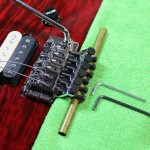We all know that music is not an exercise in technical perfection, and that the goal is not just to play more in tune and more “perfectly” than the next person, but it’s reeeally hard to let go of that desire for note-perfect performances – especially in auditions and competitions.
But get this. Paradoxically, one of the key ingredients to performance/audition success (and a “perfect” performance) is letting go of this fixation on perfection.
What? That sounds backwards.
It does sound a little counterintuitive, but it turns out that perfection is an illusion. It’s like the mythical pot of gold at the end of a rainbow. The closer you get to it, the further away it moves. The more you improve, the more room for improvement you will see.
Aiming for perfection is one thing. Expecting perfection, demanding it, and beating yourself up for falling short dooms you to failure, frustration, and diminished confidence and motivation.
So what? Do I just lower my standards then?
Not exactly. Keep your standards high, maybe even raise them – but change your definition of perfection.
The Problem with Perfectionism
I once heard someone define perfectionism as “getting so stuck in the details that you forget the goal.” Technique is really just a means to an end, but we easily forget. We spend most of our time focusing on technique and technical issues, working to improve our skills in this area and often forget what for. When we begin learning a new piece, the majority of our focus starts with the technical details rather than the musical elements, and many times we don’t tie the two together until after we’ve gotten the technical elements under our fingers. However, this approach is actually sort of backwards (and no, it doesn’t matter if we are beginners or advanced world-class soloists.
Pianist Leon Fleisher once remarked that you only need as much technique is required to say what you want to say.
It’s a little bit like learning a foreign language. The whole idea is to be able to communicate with another individual, right? You may not have the accent down, nor even the correct grammatical structure, or appropriate word choice, but your primary goal is probably to be able to make it to the bathroom before it’s too late, not to speak like a native speaker, right? With your goal defined, then you figure out out all the details (vocabulary, grammar, pronunciation) of how to get this message across.
It’s very much the same in music – that we must first figure out what it is that we wish to say or communicate to our audience, after which we will then know how much work we require on technical issues so as to have the capacity to convey this successfully. Want to convey heartache in this phrase? What musical elements would convey this? What sort of tone, articulation, phrasing, etc. would suggest heartache? What technique is required to successfully execute these musical elements? Bow control? Breath control? Left hand/right hand coordination?
How Perfectionism Prevents You from Doing Your Best
So here’s the thing. The more you focus on technical perfection, the more nervous you will tend to be. Why? Because you don’t have much else going for you – and you know that the likelihood of a technically perfect performance is close to zero. There is a part of you that knows you are likely to fail from both a technical perspective and a “move the audience to tears” perspective. No wonder you’re nervous – you’re setting yourself up to fail.
Take a golfer, for instance. If the golfer focuses too much on swinging “perfectly” and not enough on where they want the ball to go, the ball often doesn’t go where they wanted it to go. How perfect the swing is doesn’t really matter – the final destination of the ball is what is important. Focus instead on where you want the ball to go, and your body figures out a way to get it there (assuming you have had the proper training, and have practiced correctly).
Just as it is possible to move someone to tears with a less than “perfect” performance which nonetheless contains your heart and soul, it is also possible to put an audience to sleep with a note-perfect performance that has no message – a performance that is essentially just a well-rehearsed sequence of pretty sounds and not much else.
Clarinetist James Campbell once said that if you’re nervous, it means you don’t know the music well enough. I think he means that if you really know the music, have a very clear idea about what you are trying to say, and remain focused on this during your performance (the message, not the how-to technical details of it), the limitations of your brain’s attentional capacity leave it with very little opportunity to process thoughts related to worry, nervousness, failure, etc. In other words, you end up being so focused on the important things that matter and that you have control over, that you don’t have time to be nervous.
When you focus on the music and what it is that you intend to “say”, nerves tend to be less of an issue, but more importantly, you also tend to play better – even in terms of intonation and sound. When you know you have something special to communicate, you tend to just concern yourself with saying it, instead of worrying if it will come out “perfectly”.
Ok, I can see the benefit of letting go of perfection in concerts, but what about auditions/competitions? The point is to win, right?
It’s actually the same idea with competitions/auditions. Yes, it’d be great to win, but that isn’t really up to you.
You Have a Responsibility to the Audience, Not for the Audience.
What does this mean?
You have a responsibility to show the panel the most authentic version of who you are and what you have to offer. You don’t really know what the panel is looking for anyway, and certainly can’t control what they think about your performance, so you might as well show them who you really are, instead of trying to sound like someone you are not. Sure, they may hate it, and you might not represent the kind of player or “sound” they are looking for, but at least you took a stand and played your best instead of sounding like a sub-par version of someone else.
Do you need to play perfectly? Yes, most definitely, but this is only a part of what you work out in the practice room. It is counterproductive to make technique your sole focus when you’re standing in front of the screen. This leads to “paralysis by analysis” and technical mistakes, not to mention a dull, uninspired performance.
Take a Stand
I used to watch a lot of home improvement shows on HGTV, and I remember one show where a young couple redesigned their great room with a gothic-inspired look. Lots of blacks, reds, stone statues, etc. It was totally not my style and would have creeped me out to live there, but I had to admit that it was extremely well done. They totally committed to the style, and didn’t compromise on anything. No apologies, no punches pulled. In this sense it was so much more well done than the other two couples’ makeovers that were also shown in that episode.
Bottom line? Take a stand. Cultivate the highest of standards, but music-basedstandards that revolve around your musical intentions and how successfully you are able to convey them rather than technique-based standards such as perfect intonation and sound. You’ll find that when you have some really cool, interesting, and compelling musical ideas to share, you’ll be less nervous, your performance will be of a far greater quality, and paradoxically, you will probably find that your sound and intonation improve as well.
Parting Thought
I’ll leave you with a quote “The only reason for mastering technique is to make sure the body does not prevent the soul from expressing itself.”
Let go of perfection in favor of cultivating a clear message, and you’ll find yourself playing more perfectly in the delivery of this message.




